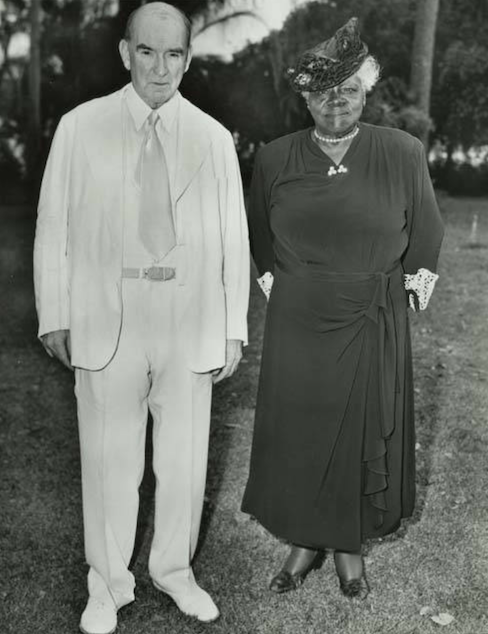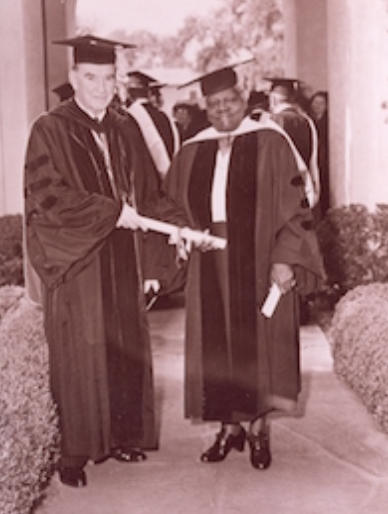
Courtesy of Rollins College Archives
Hamilton Holt stands with Mary McLeod Bethune after she received her honorary degree in Humanities in 1949.
This month is Black History Month, a perfect time to look back to 1949 when Hamilton Holt, Rollins’ eighth president, awarded a female civil rights leader an honorary degree, raising standards for institutions across the country.
Holt’s activism was evident in his friendship and academic correspondence with Mary McLeod Bethune, known for her accomplishments in education and civil rights. In 1935 she founded the National Council of Negro Women, a non-profit organization whose mission is to lead, advocate for, and empower women of African descent.
More notably, she co-founded Bethune-Cookman College, a historically black university, which is now Bethune-Cookman University in Daytona Beach, Fla. She was also a prominent figure in Washington, as she was Franklin D. Roosevelt’s special advisor on minority affairs.
Holt’s friendship with Bethune went one step further when he fought to award her with an honorary doctoral degree of Humanities in 1947. Unfortunately, without the Board of Trustees approval at Rollins, Holt was not allowed to do so at that time.
In an act of defiance to the Board of Trustees, Holt awarded Susan Wesley, an African American, the Rollins Decoration of Honor on June 2, 1948. Wesley had dedicated more than 24 years of her life to keeping the Cloverleaf Cottage, now Ward Hall, clean in her role as a housemaid.
However, he did not let the accolade for his other long-time friend, Bethune, fall short. He pushed forward, received approval, and was finally allowed to honor her with an honorary doctorate in Humanities in Knowles Memorial Chapel on Feb. 21, 1949.
This honor to an African American woman was an extremely foreign concept to those in the South, as it was the first time an African American received an honorary degree from a white Southern college. This garnered a certain amount of backlash.
A month before the honor was bestowed to Bethune, Rollins Dean Welldell C. Stone expressed to President Holt his fears about how others might respond: “If it gets out we are going to give her a degree… should we have the state militia or a cordon of local police surround the chapel to prevent a possible descent of the KKK?”
Despite the trepidation and criticism, Bethune received her honorary degree in noble fashion.
“You have in your own person again demonstrated that from the humblest beginnings and through the most adverse circumstances it is still possible for one who has the will, the intelligence, the courage… to rise from the humblest cabin in the land to a place of honor and influence among the world’s eminent,” stated Holt in his address to Bethune on the night of her award.
Following the award, Holt was swarmed with applause and celebration for breaking the cultural norms of the South.
For instance, The Miami Herald labeled it a “simple, courageous act” that catapulted Rollins beyond the “dependence on a football team for prestige.”
Others, such as the Washington University in St. Louis, Park University, and the National Council of Negro Women, Inc. admired Holt for raising the standards for society, as well as for higher-learning institutions in the South.
Bethune and Holt fostered a strong, educational relationship, to the point that Bethune pleaded with Holt for many years to become one of Bethune-Cookman College’s Board of Trustees members: “You have built up a wonderful Rollins College. You had a marvelous record before coming to Rollins. The world knows you as Hamilton Holt. Your connection with us would mean so much to our work,” Bethune said.
Holt declined this offer on several occasions, not in disrespect, but in a manner of care and attention for Rollins and Bethune-Cookman College.
“I am loath to take on any new organizations unless I can devote real time to their welfare, and I don’t see how I can do this for the Bethune-Cookman College. I shall always be glad to do any specific thing I can for the College’s welfare,” said Holt in a typed letter.
Bethune’s legacy continued even after Hamilton Holt. On March 24, 1985, Rollins College placed a stone in honor of Bethune on the Rollins College Walk of Fame. This honor was in conjunction with Dr. Oswald Bronson, President of Bethune-Cookman College.

As the first African American to recieve an honorary degree from a white Southern college, Bethune accepts her degree from Holt.











Be First to Comment